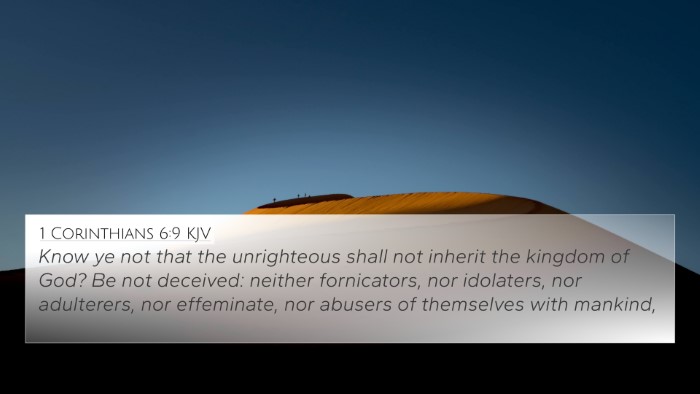Understanding 1 Corinthians 3:18
Verse: "Let no man deceive himself. If any man among you seemeth to be wise in this world, let him become a fool, that he may be wise." (1 Corinthians 3:18, KJV)
This verse confronts the prevalent attitude of worldly wisdom, emphasizing the distinction between human wisdom and divine wisdom. Here we will explore its meaning, context, and cross-references to enhance understanding.
Verse Meaning
Paul warns the Corinthians against self-deception and highlights the limitations of worldly knowledge. He concludes that true wisdom is found in humility and surrender to God's truth.
- Self-Deception: The term "Let no man deceive himself" warns against overestimating one's intelligence based on worldly standards.
- Wisdom vs. Foolishness: Embracing one's folly in comparison to worldly wisdom is a paradoxical wisdom that leads to true understanding.
- Context: This verse fits within Paul's broader argument about the nature of spiritual leadership and the wisdom of God versus human reasoning.
Commentary Insights
According to Matthew Henry, this verse serves as a caution against arrogance in knowledge and encourages church members to pursue humility. He articulates that pride in one’s intellectual achievements can lead to spiritual blindness.
Albert Barnes points out that true wisdom involves recognizing the futility of worldly knowledge compared to the profound truths of the Gospel. He asserts that embracing the wisdom of God often appears foolish to the secular mindset.
Adam Clarke elaborates on the necessity of forsaking worldly wisdom in favor of God's revelation, suggesting that believers should not only become 'fools' in the world’s eyes but do so actively as a form of spiritual growth.
Cross-References to 1 Corinthians 3:18
- James 3:13-18: This passage explores the characteristics of true wisdom, contrasting it with earthly and unspiritual wisdom.
- 1 Corinthians 1:18: The message of the cross is deemed foolish by those who are perishing but is the power of God for those who are being saved.
- 2 Corinthians 10:12: Paul states that comparing oneself with others is unwise, reinforcing the theme of genuine wisdom.
- Colossians 2:3: In Christ, are hidden all the treasures of wisdom and knowledge, emphasizing reliance on divine wisdom.
- Proverbs 3:7: "Be not wise in your own eyes; fear the Lord, and turn away from evil." This highlights the danger of self-styled wisdom.
- Matthew 5:3: "Blessed are the poor in spirit," indicating the value of spiritual humility.
- Isaiah 29:14: God will bring an end to the wisdom of the wise, emphasizing the transient nature of human wisdom.
Thematic Connections
This verse establishes a framework for understanding spiritual maturity. Here are some connections to others Bible verses that relate to this theme.
- Humility in Wisdom: Proverbs 11:2 - "When pride comes, then comes disgrace, but with humility comes wisdom."
- Faith Over Knowledge: Romans 1:21 - "For although they knew God, they neither glorified him as God nor gave thanks to him, but their thinking became futile..."
- Spiritual Growth: Ephesians 4:14 - "Then we will no longer be infants, tossed back and forth by the waves, and blown here and there by every wind of teaching."
Applying the Verse
In order to apply the truths from this scripture, consider the following:
- Reflection: Contemplate areas in your life where worldly wisdom may have led to misunderstandings or missteps.
- Increase Understanding: Engage in Bible study, focusing on cross-referencing relevant verses to enhance understanding.
- Seek God’s Wisdom: Pray for discernment and clarity in matters of faith, embracing the humility required to accept God’s guidance.
Conclusion
1 Corinthians 3:18 serves as a vital reminder of the contrast between divine wisdom and worldly understanding. By recognizing the limitations of human intellect, believers are encouraged to grow in their faith and embrace God's truth, reflective of their spiritual journey.
As you delve deeper into Biblical study, consider using tools for Bible cross-referencing and themes. These methods will enhance your understanding and strengthen your faith through inter-Biblical dialogue and comparative analysis.
Remember, the journey of understanding scripture is enriched by acknowledging the connections between Bible verses, leading to deeper insights and transformative growth.


























